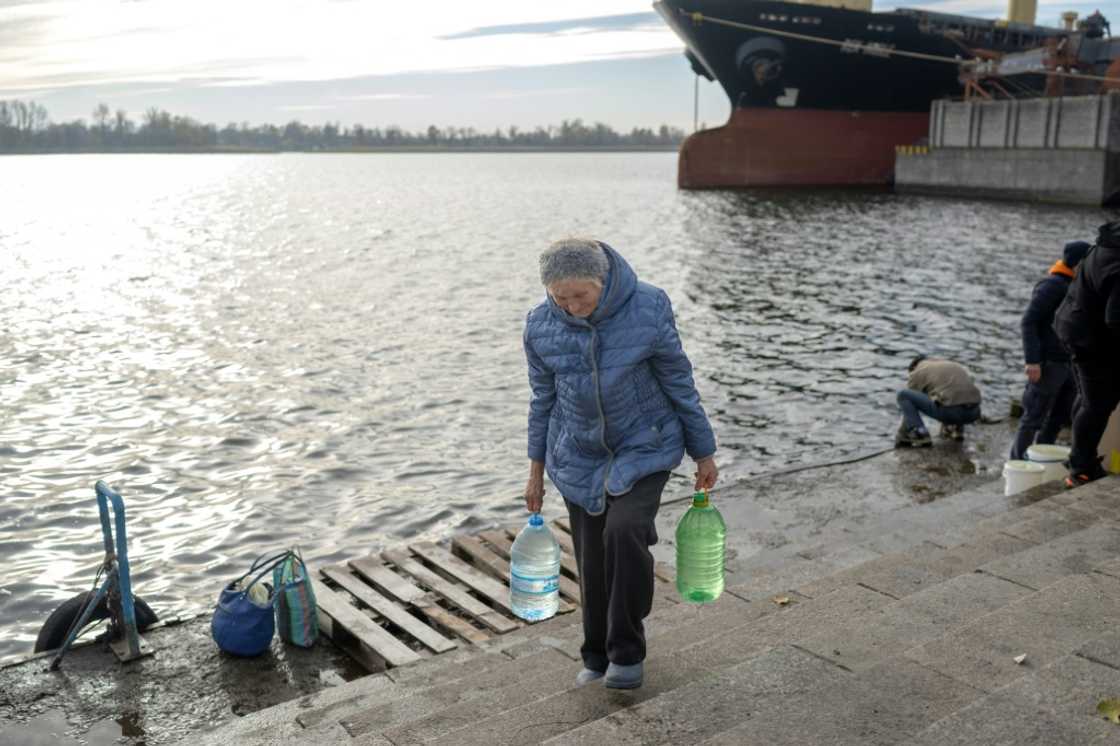Missile strikes pound Ukraine cities

Source: AFP
PAY ATTENTION: Сheck out news that is picked exactly for YOU ➡️ find “Recommended for you” block on the home page and enjoy!
Missile strikes hit cities across Ukraine on Tuesday and prompted mass power outages, a few days after a humiliating Russian retreat in the nation's south and in the middle of the G20 summit.
The fresh bombardment, which officials said struck residential buildings in Kyiv, trespassed on days of Ukrainian jubilation over the recapture of the key city of Kherson.
Lviv in the west and Kharkiv in the east were also attacked on Tuesday, authorities said, but there were no immediate information on possible casualties.
Kyiv mayor Vitali Klitschko announced the attack following reports that air raid sirens were sounding across all Ukraine's regions, saying at least half of Kyiv's residents were without power.
"According to preliminary information, two residential buildings were hit in the Pechersk district," he said adding "several missiles were shot down... by air defence systems.
The deputy head of the president's office Kyrylo Tymoshenko said the missiles had been fired by Russian forces.
PAY ATTENTION: Follow us on Instagram - get the most important news directly in your favourite app!

Source: AFP
He distributed footage of the apparent scene of the attacks, showing a blaze at a Soviet-era, five-storey residential building.
"The danger has not passed. Stay in shelters," he added in the statement online.
The atttacks came after Russian appointed officials in Nova Kakhovka said they were exiting the important southern city, blaming artillery fire from Kyiv forces, which have been reclaiming swathes of the south after a Russian retreat.
Their announcement comes one day after Ukrainian President Volodymyr Zelensky visited the recently liberated regional capital of the Kherson region and announced "the beginning of the end of the war".
Zelensky told the G20 summit in Bali on Tuesday "now is the time" to end the war.
"I am convinced now is the time when the Russian destructive war must and can be stopped," he said via video link, according to a speech obtained by AFP. "It will save thousands of lives."
Ukraine forces since September have been pushing deeper into the south and Russia announced last week a full withdrawal from the regional capital of the southern Kherson region, allowing Ukraine to enter.
"Employees of the state administration of Nova Kakhovka, as well as state and municipal institutions have left the city and were relocated to safe locations in the region," the Moscow-installed authorities said on Telegram.
The Russian-backed officials said after Moscow's pull-out from Kherson city, Nova Kakhovka came under "indiscriminate fire" and "life in the city is unsafe."

Source: AFP
They also claimed "thousands of residents" had followed their recommendation to leave to "save themselves", saying Kyiv's forces will seek "revenge on collaborators."
The authorities claimed that this did not mean that the city was "abandoned" and that "crews of municipal workers" were working to ensure the "functioning of energy and water supply systems."
Key dam in 'dangerous' state
Nova Kakhovka sits on the eastern bank of the Dnipro River, now a natural dividing line between Ukraine's forces that retook Kherson city on the west side and Russia's forces on the opposing bank.
It is also home to the Kakhovka hydroelectric dam which was captured in the beginning of the invasion because of its strategic importance supplying the Moscow-annexed Crimean peninsula.
The Russian-controlled dam is a particular focus now after Zelensky accused Russian troops of planning to blow it up to trigger a devastating flood.
Any problem with the dam would cause water supply problems for Crimea, which has been under Russian control since 2014 and which Ukraine hopes to recapture.
Russia forces said last week that a Ukrainian strike had damaged the dam.
The Russian-appointed head of the occupied part of the Kherson region, Vladimir Saldo, said Tuesday the dam was no longer operating.
"Today, the turbines do not produce electricity, and there is no need for this," he said on state-run television channel Rossiya-24, according to Russian agencies.
"The situation is more dangerous -- not with electricity generation -- but with the dam itself, which, in the event of an explosion, would flood a fairly large area."
The loss of Kherson was the latest in a string of setbacks for the Kremlin, which invaded Ukraine on February 24 hoping for a lightning takeover that would topple the government in days.
NATO secretary general Jens Stoltenberg nonetheless cautioned that Ukraine was facing difficult months ahead and said that Russia's military capability should not be underestimated.
New feature: Сheck out news that is picked for YOU ➡️ find “Recommended for you” block on the home page and enjoy!
Source: AFP





